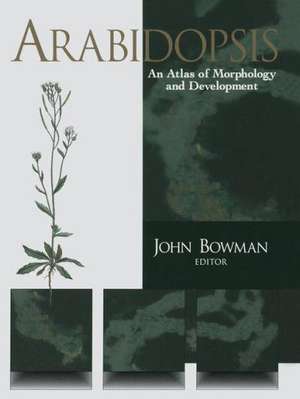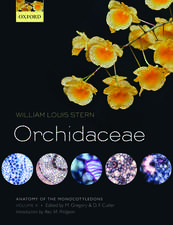Arabidopsis: An Atlas of Morphology and Development
Editat de John Bowmanen Limba Engleză Paperback – 29 sep 2011
Preț: 968.65 lei
Preț vechi: 1181.28 lei
-18% Nou
Puncte Express: 1453
Preț estimativ în valută:
185.35€ • 193.14$ • 153.47£
185.35€ • 193.14$ • 153.47£
Carte tipărită la comandă
Livrare economică 03-17 aprilie
Preluare comenzi: 021 569.72.76
Specificații
ISBN-13: 9781461276005
ISBN-10: 1461276004
Pagini: 472
Ilustrații: 450 p.
Dimensiuni: 210 x 279 x 25 mm
Greutate: 1.11 kg
Ediția:Softcover reprint of the original 1st ed. 1994
Editura: Springer
Colecția Springer
Locul publicării:New York, NY, United States
ISBN-10: 1461276004
Pagini: 472
Ilustrații: 450 p.
Dimensiuni: 210 x 279 x 25 mm
Greutate: 1.11 kg
Ediția:Softcover reprint of the original 1st ed. 1994
Editura: Springer
Colecția Springer
Locul publicării:New York, NY, United States
Public țintă
ResearchDescriere
The recent application of molecular genetics to problems of developmental biology has provided us with greater insight into the molecular mechanisms by which cells determine their developmental fate. This is particularly evident in the recent progress in understanding of developmental processes in model animal systems such as Drosophila melanogaster and Caenorhabditis elegans. De spite the use of plants in some of the earliest genetics experiments, the elucida tion of the molecular bases of plant development has lagged behind that of animal development. However, the emergence of model systems such as Arabi dopsis thaliana, amenable to developmental genetics, has led to the beginning of the unraveling of the mysteries behind plant morphogenesis. This atlas of the morphology and development of the weed Arabidopsis is in tended to be a reference book, both for scientists already familiar with plant anatomy and for those utilizing Arabidopsis who have come from other fields. The primary concentration is on descriptions rather than interpretations, as interpretations evolve and change relatively rapidly, whereas the evolution of plant form takes place on a much longer time scale. Molecular genetics and the use of mutants to probe wild-type gene function rely on the wild-type being well characterized. With this in mind, an attempt was made to present detailed descriptions of wild-type structure and development, to provide a foundation for comparison with the selected mutants in the atlas. More importantly, it is hoped that the atlas will serve as a valuable resource in the characterization of new mutants.
Cuprins
1. Vegetative Development.- The Seedling.- The Apical Meristem.- Apical Meristem Mutants.- The Leaf.- Light-Mediated Development.- Trichomes.- Phytohormones.- Morphological Mutants.- 2. Roots.- Wild-type Structure.- Root Mutants.- Root Hairs.- Root Growth.- 3. Flowers.- The Inflorescence.- The Inflorescene Apical Meristem.- The Wild-type Flower.- Floral Organs.- Nectaries.- Floral Transition Mutants.- Inflorescence Mutants.- Floral Meristem Mutants.- Floral Organ Identity Mutants.- Floral Organ Number Mutants.- Floral Organ Mutants.- 4. Pollen.- Wild-type Microgametogenesis.- Male Sterile Mutants.- 5. Ovules.- Ovule Development.- Megasporogenesis.- Zygote and Early Embryo Development.- Microtubules During Female Reproductive Development.- The Mature Embryo Sac.- 6. Pollination.- Pollen—Stigma Interactions.- Pollen Tube Growth.- Fruit Development.- 7. Embryogenesis.- Early Embryo Development.- Reserve Deposition in the Cotyledons.- Endosperm Development.- Seed Morphology.- 8. Pathogens.- Pseudomonas.- Peronospora.- Nematodes.- References.- Gene Index.









